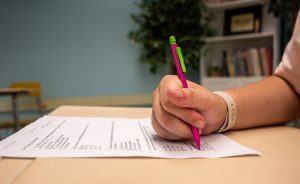Opinion: Rebounding from COVID
Children of the pandemic have experienced highly abnormal setbacks, and their recovery will require patience.
The pandemic has forced many children to develop under unusual circumstances, which has the potential to affect their future.
March 21, 2022
As mask mandates are lifted across the country, it seems as though the horrible pandemic that has consumed the last two years is finally coming to an end. However, a generation of young children have been forced to start their education remotely and develop cognitively and socially while in isolation. For them, there is the potential that the pandemic is far from over.
At the beginning, even touching a shelf in the grocery store was believed to be a danger. For the child’s own safety, they had to refrain from learning through their sense of touch. However, this could pose a problem as these children start to experience a post-pandemic world.
The lack of security of a child’s surroundings can lead to an over-reliance on their parents. During the pandemic, children constantly had to be reassured if something was safe for them to touch. As they integrate back into an environment that is safe for exploring, they might hesitate to be curious of the world around them.
Additionally, many children have failed to create the early relationships that are vital for their social development. Much like touch, socialization has also posed a danger for the last two years. Children have been completely isolated from their fellow peers, so many were unable to form strong friendships.
These relationships teach children the basic social skills that are required by everyday life. For example, many children, especially around the age of four, start to learn the concepts of empathy, problem solving, and emotion regulation by forming friendships with other children around them. Without these friendships, children could struggle to socially interact with others.
Moreover, many parents lost their jobs due to the pandemic. Therefore, because of Covid-19, an additional six million children are in danger of not having enough food. In total, 17 million children across the country are now depending on food banks.
Unfortunately, children are also feeling the effects of the stress and anxiety that Covid-19 has caused. Children are naturally exposed to stressed parents and teachers, and they pick up the emotions that are elicited by the adults around them.
Also, children have been isolated from other children. Much like everyone else, children have also felt the loneliness that accompanied the quarantines and social distancing of the pandemic. There has been a 24 percent increase in the number of mental health-related emergency room visits for children between the ages of 5 to 11.
Developmentally, children are also falling behind. Compared to previous years, pandemic-born babies scored an average of two standard deviations lower on tests that measure development much like how IQ tests measure intelligence. The tests measured the child’s language, puzzle-solving skills, and motor skills.

The NWEA released a report that documented achievement levels of 4.4 million American children from grades three through eight. According to the report, pandemic children are scoring five to ten percentile points compared to math scores from previous years.
However, there is good news, too. During the pandemic, drug use among kids has decreased. Additionally, juvenile arrest has also decreased. Although the pandemic has caused emotional distress, data supports that some children learned to handle the distress in healthier ways, rather than resorting to harmful substances and bad behavior.
Nevertheless, children of the pandemic have experienced many set-backs that are abnormal for child development. Hopefully, as they enter a post-pandemic world, they will be able to rebound with ease. However, it will take much time and patience from parents, teachers, and children themselves.
_____________________________________________________________________________________
Editors’ note: All opinions expressed on The Uproar are a reflection solely of the beliefs of the bylined author and not the journalism program at NASH. We continue to welcome school-appropriate comments and guest articles.












